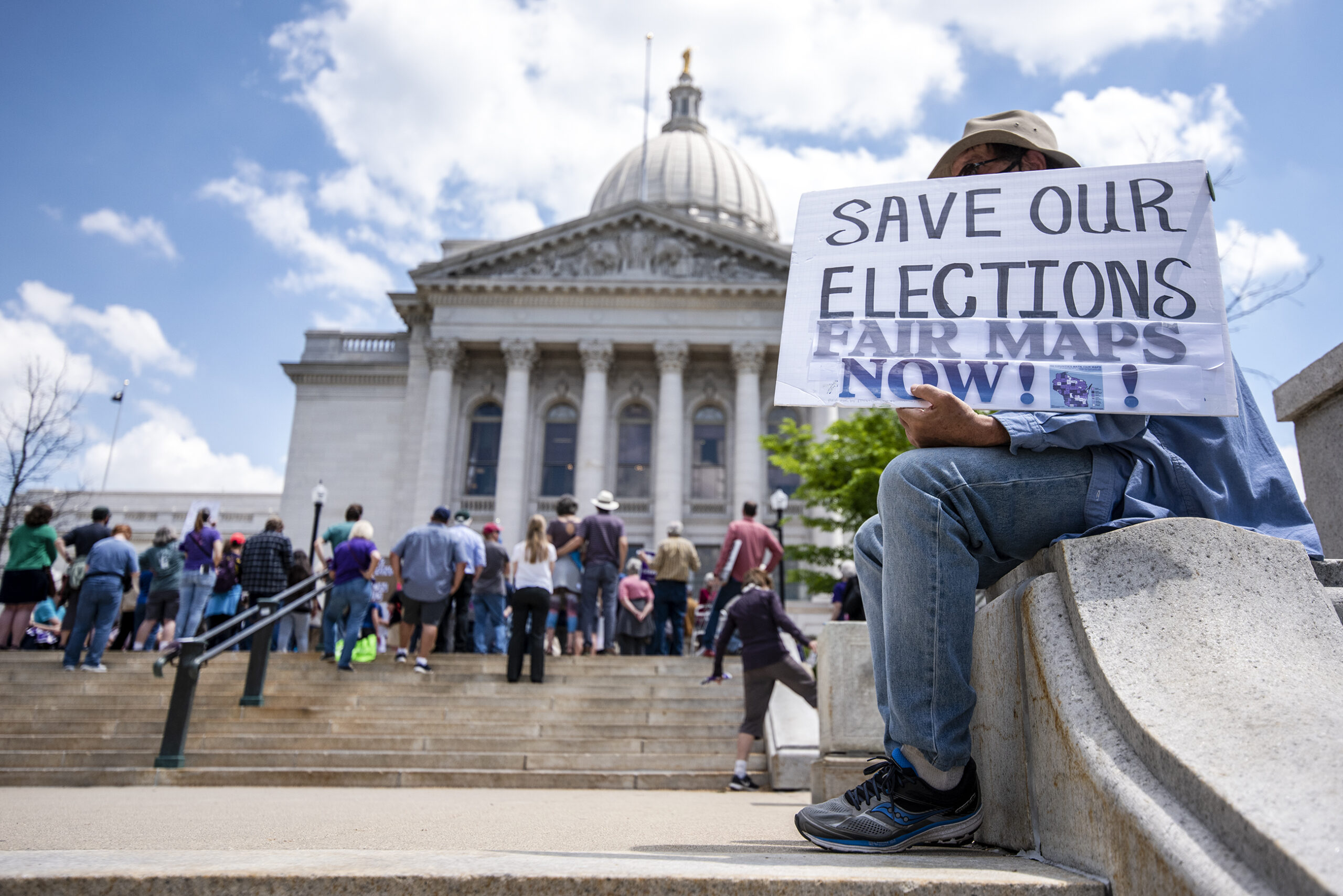The Wisconsin Supreme Court has declared the state’s Republican-drawn legislative maps unconstitutional, a bombshell ruling that could shift the balance of political power in the Legislature for the first time in more than a decade.
In a decision released Friday, the court’s liberal majority said the current maps violate the Wisconsin Constitution’s requirement that districts must be contiguous.
Writing for the majority, Justice Jill Karofsky said the constitution’s contiguity requirements “mean what they say,” a mandate she said was supported by past precedent and common sense.
Stay informed on the latest news
Sign up for WPR’s email newsletter.
“Because the current state legislative districts contain separate, detached territory and therefore violate the constitution’s contiguity requirements, we enjoin the Wisconsin Elections Commission from using the current legislative maps in future elections,” Karofsky said.
Democratic voters who filed the redistricting lawsuit also argued the court’s former conservative majority violated the constitution’s separation of powers doctrine when it chose maps that were vetoed by Democratic Gov. Tony Evers. Karofsky said the court didn’t need to address that claim after deciding the maps do not satisfy the constitution’s contiguity requirement.
Karofsky also said the court will not order new elections for all 132 state lawmakers, as Democratic plaintiffs requested, calling such a move a “drastic remedy.”
The court did not immediately draw new districts to replace the current ones but said it would begin that process in case the Legislature and governor are not able to agree on new maps.
“Remedial maps must be adopted prior to the 2024 elections,” Karofsky wrote. “We are hopeful that the legislative process will produce new legislative district maps. However, should that fail to happen, this court is prepared to adopt remedial maps.”
FOR MORE: WPR’s investigative podcast series, “Mapped Out”
Karofsky said parties to the case would be given the opportunity to submit maps, along with expert testimony to bolster their cases.
Joining Karfosky’s majority opinion were liberal Justices Ann Walsh Bradley, Rebecca Dallet and Janet Protasiewicz, whose April election flipped the court from conservative to liberal for the first time in 15 years.
In three separate dissenting opinions, the court’s conservative justices accused their liberal colleagues of pre-judging the case, with Justice Annette Ziegler writing that “this deal was sealed” the night liberal Protasiewicz was elected.
“Unfortunately, this latest unlawful power grab is not an outlier, but is further evidence of a bold, agenda-driven pattern of conduct,” Ziegler said.
Conservative Justice Brain Hagedorn called the ruling “a sad turn for the Wisconsin Supreme Court.”
“Today, the court dives headlong into politics, choosing to wield the power it has while it has it,” Hagedorn said. “Wisconsinites searching for an institution unpolluted by partisan warfare will not find it here.”
Conservative Justice Rebecca Bradley accused her liberal colleagues of “riding a Trojan horse named Contiguity” to breach the lines “separating the judiciary from the political branches in order to transfer power from one political party to another.”
“With its first opinion as an openly progressive faction, the members of the majority shed their robes, usurp the prerogatives of the legislature, and deliver the spoils to their preferred political party,” said Bradley. “These handmaidens of the Democratic Party trample the rule of law, dishonor the institution of the judiciary, and undermine democracy.”

Democrats celebrate ruling while Republicans hint at appeal to the US Supreme Court
The ruling is a major victory for Wisconsin Democrats, who’ve remained powerless in the Legislature for more than a decade, even in years when their party won statewide races for other offices from governor to president.
Democratic Gov. Tony Evers vowed to submit new maps to the court that reflect Wisconsin’s “purple state” makeup.
“And I remain as optimistic as ever that, at long last, the gerrymandered maps Wisconsinites have endured for years might soon be history,” Evers said in a written statement.
Republicans, who drew the maps and have used them to cement massive legislative majorities, have hinted for months they could appeal any maps ruling to the U.S. Supreme Court, a move Assembly Speaker Robin Vos, R-Rochester, hinted at in his own statement Friday.
“The U.S. Supreme Court will have the last word,” Vos said.
Redistricting was one of the top issues in the last Wisconsin Supreme Court election, in which Protasiewicz defeated former conservative Justice Dan Kelly by 11 percentage points. Republicans voiced outrage at Protasiewicz’s comments during the campaign about the GOP maps being “rigged” and that she would welcome a “fresh look” at redistricting.
Even before the election, there was talk from Republicans of impeaching Protasiewicz, who accused her of pre-judging the redistricting issue while accepting around $10 million in donations from the Democratic Party of Wisconsin. Protasiewicz has said she was only sharing her personal values and that she never committed to ruling a certain way if a lawsuit challenging the GOP maps was filed. Vos said this week that impeaching Protsaiewicz was “very unlikely.”
Court appoints experts, sets timeline for new redistricting process
In a separate order Friday, the court’s majority appointed two experts to oversee its redistricting process, laying out deadlines for parties who want to submit new maps.
Under the order, Bernard Grofman and Jonathan Cervas will serve as the court’s consultants in the case. Grofman is a professor of political science and an adjunct professor of economics at the University of California, Irvine. Cervas is a redistricting expert at Carnegie Mellon University.
As she did with the main decision, Justice Rebecca Bradley dissented, saying the court had abdicated its responsibilities.
“With no lawful authority, the majority … outsources the legislature’s constitutional responsibility for redistricting to two out of-state, unelected, and unaccountable political scientists,” Bradley wrote.
The court gave parties until Jan. 12 to file remedial maps and gave Grofman and Cervas until Feb. 1 to file a report on the proposals.
Wisconsin Public Radio, © Copyright 2025, Board of Regents of the University of Wisconsin System and Wisconsin Educational Communications Board.







